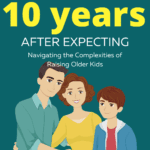While advice on raising babies can be found everywhere, tips for parenting tweens, teens, and older kids can be hard to find. Learn important parenting topics for parents raising older kids.
Many parents agree that they felt absolutely lost when they left the hospital with their first newborn baby.
We all share this dumbstruck wait-what-do-I-do-with-this look on our face as we are wheeled to the car holding our tiny fragile human that relies on us to live.
Luckily, new parents are equipped with two amazing tools.
First, whether we realized it at the time or not, motherhood comes with a host of natural maternal instincts. I never felt closer to nature than when my baby instinctively knew I was his mother.
It takes time to understand these new attachments and gut feelings, but we have science in our corner, walking us through these beautiful, yet overwhelming times.
Secondly, we have more advice than we know what to do with.
We have family and friends, Google, and tons of books – including the classic motherhood guide What to Expect When You’re Expecting.
While we have many resources on diapers, nursing, and sleep training, no one seems to prepare us for what to expect 10 or so years down the line – when the real chaos happens.

What to Expect 10 Years Later
When your children get older, simply “keeping them alive” will not cut it.
Children need to be taught values, life lessons, and social skills. No pressure!
Although you will undoubtedly feel unqualified at times, your parenting duties will start to include responsibilities that resemble those of a teacher, prison warden, chauffer, therapist, and so much more.
Luckily, if you raise your kids with love in your heart, you are probably already teaching them these important lessons and values.
However, if you feel that you need a little extra support, follow these simple tips for parenting tweens, teens, and kids of all ages.

7 Essential Chapters for Kids
While parenting it NOT one size fits all, consider this your virtual parenting 101 book on raising older kids.
These 7 chapters, paired with your own parental instincts, will help you navigate the complexities of raising tweens, teens, and older kids.
1) Acts of Kindness
If my 30 plus years on this blue planet taught me anything, it is this:
I do not want to raise children who are jerks.
I want to raise kids that lift up other kids.
You can imbed kindness in your child by encouraging them to perform Random Acts of Kindness.
Teaching your child about kindness not only helps others, it helps your child.
Random acts of kindness produce endorphins, the brain’s natural painkiller.
Dartmouth College found that kind people have 23% less cortisol (the stress hormone) and age two times slower than the average population.
Click here for 20 Free Random Acts of Kindness for Kids.
2) Lessons in Honesty
Kids are literally wired to lie. It’s built into their developing mind to go to extremes to avoid consequences.
Dr. William Klemm, an author and a senior professor of Neuroscience at Texas A&M University, believes that children are naturally dishonorable. He suggests that parents must teach their kids the meaning of honesty.
If your child has lied or has tried to deceive you, it is important to remember that it is normal childhood behavior.
As a parent, it is your job to teach them right from wrong. Guide them away from lies and towards a place where they can openly speak the truth and understand what it means to be an honorable human.
These 5 parenting tips for tweens and kids will help you raise honest kids.
3) Mindfulness Matters
I’ve always admired my young kid’s ability to truly stop and smell the roses – live in the moment.
However, as kids get older and life gets more fast-paced, this quality becomes lost.
Mindfulness is the basic ability to be fully present in the moment. Aware of where we are and what we’re doing. The concept of mindfulness refers to being able to live in the present moment.
Luckily, there are simple activities that kids can do to recenter, focus, and love life.
Click here for 10 free and fun mindfulness activities for teens and kids.

4) Safety Priorities
Some parents avoid talking to their children about safety tips because they feel the topics may be too scary, too awkward, or they just flat out don’t think of it.
In reality, it is crucial that parents discuss certain topics with their children, especially as they get older.
Social media and internet safety must be taught to any child who will be using the internet.
Learn how to proactively talk to and prepare your children for unfortunate situations by teaching them these 5 safety tips. Your kids won’t learn these unless you talk openly about it.
5) How to be Assertive
There are 4 different types of communication styles, passive, aggressive, passive-aggressive, and assertive. Assertive is the best way to respectfully communicate with others in an open conversation.
Assertiveness refers to speaking your own mind, while still respecting the feelings of others around you. When I think of assertiveness, I think of Anna in Frozen II, who did what was right and always spoke her mind.
These 5 simple parenting tips will help you raise assertive kids who command respect and these tips to teach kids how to stand up for themselves.
6) Be a Helpful Family Member
I am not a routine-driven mom. Our bed time varies and our weekends are always unpredictable.
However, one anchor routine my kids can always rely on is the expectation that they are to help out around the house.
Chores have many benefits for kids. Research suggests that children who do chores have higher self-esteem, are more responsible, and are better equipped to deal with frustration. Additionally, these skills can lead to greater success in school, work, and even relationships.
This article includes age-appropriate chore ideas and free, printable chore checklists.

7) Teaching Kids About Emotions
If you are a parent, then you already know that can rely on these two truths:
- No kid on earth is calm all of the time
- Telling your kid to “calm down” is as effective as trying to tell a fish to breathe air
The reason for this is simple. Experts, like Lindsey Giller, PsyD, a clinical psychologist at the Child Mind Institute, explain that emotional side of the brain isn’t communicating with the rational side at a young age. The fancy name for it called “dysregulation”.
These calm down exercises will help you give your child, tween, or teen the tools they need to calm down on their own.
Final Thoughts on Tips for Parenting Tweens, Kids, and Teens
Although raising older kids comes with a new level of complexity, these simple lessons will help you teach your kid important values so that they are prepared to have a beautiful adulthood.
For more tips on raising kids that are healthy at home and strong in the world, follow us on Facebook.


Raise Kids who Come to You With Problems, Not Hide From You - Simply Rooted Family
Sunday 27th of March 2022
[…] Related: What to Expect TEN YEARS After Expecting […]
catha uy
Saturday 5th of March 2022
my daughter is turning 10 this year and realizations are really overwhelming to have witnessed their growth
Laura
Thursday 3rd of March 2022
My oldest turns 20 this year and those baby years are without question the easiest. Yes you are exhausted a lot but the emotional "stuff" that comes as your kids get older is not something I was prepared for.
Lyosha
Thursday 3rd of March 2022
great tips I think. I have to admit I don't look that far, I even find it hard to think of diapers while expecting (and I know what I am saying right now because I do currently), ten years seems miles away!
Jasmine Martin
Thursday 3rd of March 2022
This information is so crucial for all parents because you really don't know how to handle certain things when you're a parent. This will help a lot of people. Thanks for this!